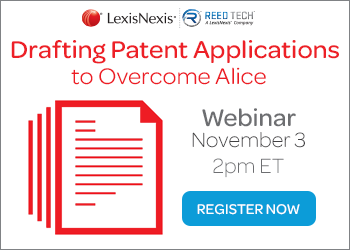 Two years after the Supreme Court’s decision in Alice v. CLS Bank there was not much favorable news to report, or hope to be given to those with computer implemented innovations. Over the last several months, however, there have been a series of important decisions by the United States Court of Appeals for the Federal Circuit that have shed significant light on the issue of patent eligibility for computer implemented methods — or software patents.
Two years after the Supreme Court’s decision in Alice v. CLS Bank there was not much favorable news to report, or hope to be given to those with computer implemented innovations. Over the last several months, however, there have been a series of important decisions by the United States Court of Appeals for the Federal Circuit that have shed significant light on the issue of patent eligibility for computer implemented methods — or software patents.
Beginning with the Court’s decision in Enfish, carrying over into the decision in BASCOM, and finally culminating in the Court’s decision in McRO (sometimes referred to as the Blue Planet case), the Federal Circuit has provided important guidance for those drafting and prosecuting patent applications.
Perhaps as important as these pro-patent eligible decisions are two decisions where the Federal Circuit found the claims to be patent ineligible. In TLI Communications and then most recently in FairWarning IP, LLC v. Iatric Systems, Inc., the Federal Circuit distinguished the claims at hand from those that have been held patent eligible. Indeed, FairWarning IP along with TLI Communications will provide patent practitioners with as much insight into what needs to be done from a drafting perspective as will Enfish, BASCOM and McRo.
Join us on Thursday, November 3, 2016 at 2pm ET for a discussion on drafting patent applications to overcome Alice, with JiNan Glasgow of Neopatents and Gene Quinn of IPWatchdog. In addition to taking as many of your questions as possible we will address the following:
- Brief overview of Alice, Enfish, TLI Communications, BASCOM, McRo and FairWarning IP.
- What these most recent Federal Circuit cases teach about drafting software patents.
- How to cope with being unexpectedly assigned to an Art Unit.
To join us for this free webinar please CLICK HERE to REGISTER.

![[IPWatchdog Logo]](https://ipwatchdog.com/wp-content/themes/IPWatchdog%20-%202023/assets/images/temp/logo-small@2x.png)

![[Advertisement]](https://ipwatchdog.com/wp-content/uploads/2024/04/Artificial-Intelligence-2024-REPLAY-sidebar-700x500-corrected.jpg)
![[Advertisement]](https://ipwatchdog.com/wp-content/uploads/2024/04/Patent-Litigation-Masters-2024-sidebar-700x500-1.jpg)

![[Advertisement]](https://ipwatchdog.com/wp-content/uploads/2021/12/WEBINAR-336-x-280-px.png)
![[Advertisement]](https://ipwatchdog.com/wp-content/uploads/2021/12/2021-Patent-Practice-on-Demand-recorded-Feb-2021-336-x-280.jpg)
![[Advertisement]](https://ipwatchdog.com/wp-content/uploads/2021/12/Ad-4-The-Invent-Patent-System™.png)






Join the Discussion
2 comments so far.
Gene Quinn
November 14, 2016 01:34 pmTodd-
Yes. Just posted.
http://knowledge.reedtech.com/h/i/300001572-drafting-patent-applications-to-overcome-alice-webinar
-Gene
Todd Erickson
November 10, 2016 12:45 pmHi Gene, is this webinar recording available online? I registered for the live event but was unable to make it.